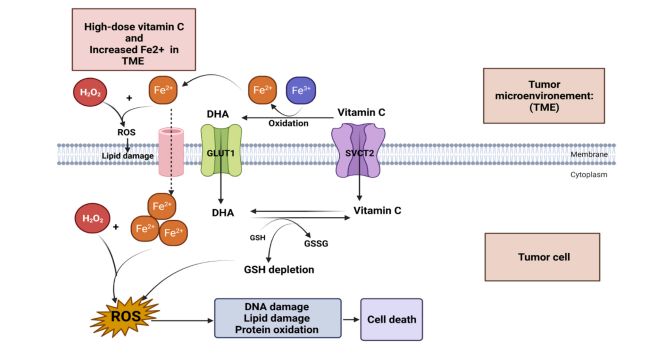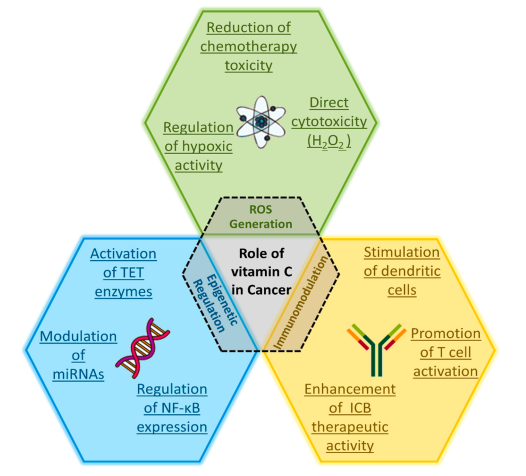High Dose Intravenous Vitamin C Increases Chemokines And Tumor-Infiltrating Lymphocytes To Enhance Anti-tumor Immunity And Immunotherapy
Role of vitamin C in immunity
Vitamin C is an important antioxidant that plays role in boosting the immune system of the body of an individual. It stimulates the immune system against foreign particles in multiple ways. It acts as a cofactor for many enzymes that are important pillars in major signaling pathways of the body. Vitamin C has a role in both the innate immune system which is a buildup system of the body and the adapted immune system that functions during the life of an organism due to environmental stimuli. Vitamin C gets accumulated in the immune cells of the body such as neutrophils or phagocytes and produces ROS. It also generates Fe+2 species in the cells and results in the killing of those cells (Bedhiafi et al., 2022).
The anti-cancer-targeted drugs are usually given to cancer patients, but they become resistant to them. In such cases, vitamin C can be given to reduce resistance and boost the immune system. Cancer cells have the ability to escape from the immune response shown by T-cells and to make themselves resistant to immune checkpoint blockade (ICB). Vitamin C increases the sensitivity of tumor cells to many conventional drugs and reduces the resistance to these drugs to make them more effective when used in combination with it (Frei & Lawson, 2008).
Experiments on human breast cancer cell lines have shown that vitamin C increases the antineoplastic activity of many chemotherapeutic drugs such as cisplatin, paclitaxel, and doxorubicin.

It is found that vitamin C enhances the effects of radiotherapy and chemotherapy which are the conventional treatment modalities given to cancer patients. Mostly, cancer patients become resistant to these therapies as they have increased energy production in them and can easily repair the damage caused by therapies. Vitamin C is often given in combination with these therapies to reduce the resistance in tumor cells by boosting the immune system and response of the immune system against the tumors (Magrì et al., 2020).
Role of vitamin C in chemokines production
Vitamin C plays a very crucial role in modulating the immune system against cancer by producing many cytokines and chemokines. It stimulates the function of the immune system when given to the cancer patient. FOXP3 regulatory elements that are found in the cell are regulated by the TET enzyme. TET promotes the function of regulatory T-cells by demethylating FOXP3 elements. Vitamin C has an important role in promoting the Treg cell’s function by the TET mechanism thus helping in cancer immunotherapeutics.
Experimental findings have suggested that vitamin C not only plays role in promoting the immune function of Treg cells but, it also promotes the function of natural killer cells NKCs in the body (Bedhiafi et al., 2022).
Experimental Findings
Many in Vivo and in vitro experiments have been performed that showed that vitamin C has a role in promoting the function of Treg cells as well as natural killer cells in the body and this helps fight against many types of cancers. So, using vitamin C against cancer can be an effective modality.
Experiments on animal models have also shown that vitamin C plays role in stimulating the dendritic cells of the immune system to produce interleukin 12 which is a very important cytokine in fighting against cancers (Lee, 2009).
Clinical Trials
Clinical trials were performed on different types of cancer patients, such as breast, lung, colon, and thyroid cancers were performed to check the effects of vitamin C injected intravenously. it was seen that when vitamin C was given to these patients, the plasma levels of cytokines were changed in the tumor cells and many anti-inflammatory mechanisms were also affected by vitamin C in those cells. Different cytokines and interleukins that play role in promoting the cancers were downregulated in the patients. IL-2 and IL-6 along with many proinflammatory cytokines that activate multiple signaling pathways such as TNF alpha to promote the proliferation of tumor cells were downregulated by intravenous injection of Vitamin C. so, this release of cytokines and modulation of inflammatory mechanisms in the cancer patients stop the progression of tumors and all this was done as a result of vitamin C injection.
It is also found that vitamin C plays role in increasing the production of CD4+ and CD8+ T cells in the tumor microenvironment. This also increases levels of many chemokines in the TME such as ligands 9, 10, and 11. Thus, it has a major role in improving the immune system function to fight against cancers (Carr & Maggini, 2017).
Vitamin C as an adjuvant immunotherapy
Adjuvant therapies are being given to cancer patients in multiple ways. Many targeted inhibitors and immunotherapeutic drugs are being used in this regard. But the cancer cells make them resistant to these therapies and even to radiotherapy and chemotherapy.
Recently many pre-clinical and clinical trials have proved that vitamin C can also be given as adjuvant immunotherapy to cancer patients suffering from any type of cancer. Vitamin C helps in killing cancer cells through many different mechanisms. It has the ability to produce oxidative stress in the cells by increasing the production of reactive oxygen species in them and ultimately killing of tumor cells results (Golde, 2003).
Vitamin C has always been effective in boosting the body’s immune system. It has also proved efficient in stimulating the immune system to fight against multiple tumors. It plays role in the production of cytokines and improves the function of many immune system cells such as Treg cells and natural killer cells. It stimulates the function of regulatory T cells by the TET mechanism. It also stimulates the dendritic cells for the production of interleukins. Vitamin C has a tendency to downregulate many signaling pathways in the cancer cells that are very crucial for the proliferation and progression of tumors. If these pathways are inhibited in the tumor cells, they will not be able to proliferate and metastasize any further, and so the tumor progression stops (Magrì et al., 2020).

Conclusion
Vitamin C is proven to be very effective against many types of tumors in preclinical and clinical trials. It is given to patients either orally or intravenously and has proved to be more efficient when injected intravenously. It is very effective in killing cancer cells by increasing oxidative stress in the cells and by boosting the immune system through multiple mechanisms to help fight the body against cancer. It is being given as adjuvant immunotherapy as well. And will be a promising therapy for all types of cancers in the near future.
References
Bedhiafi, T., Inchakalody, V. P., Fernandes, Q., Mestiri, S., Billa, N., Uddin, S., Merhi, M., & Dermime, S. (2022). The potential role of vitamin C in empowering cancer immunotherapy. Biomedicine and Pharmacotherapy, 146, 112553. https://doi.org/10.1016/j.biopha.2021.112553
Carr, A. C., & Maggini, S. (2017). Vitamin C and immune function. Nutrients, 9(11), 1–25. https://doi.org/10.3390/nu9111211
Frei, B., & Lawson, S. (2008). Vitamin C and cancer revisited. Proceedings of the National Academy of Sciences of the United States of America, 105(32), 11037–11038. https://doi.org/10.1073/pnas.0806433105
Golde, D. W. (2003). Vitamin C in Cancer. Integrative Cancer Therapies, 2(2), 158–159. https://doi.org/10.1177/1534735403002002009
Lee, W.-J. (2009). The Prospects of Vitamin C in Cancer Therapy. Immune Network, 9(5), 147. https://doi.org/10.4110/in.2009.9.5.147
Magrì, A., Germano, G., Lorenzato, A., Lamba, S., Chilà, R., Montone, M., Amodio, V., Ceruti, T., Sassi, F., Arena, S., Abrignani, S., D’Incalci, M., Zucchetti, M., Di Nicolantonio, F., & Bardelli, A. (2020). High-dose Vitamin C enhances cancer immunotherapy. Science Translational Medicine, 12(532). https://doi.org/10.1126/scitranslmed.aay8707
